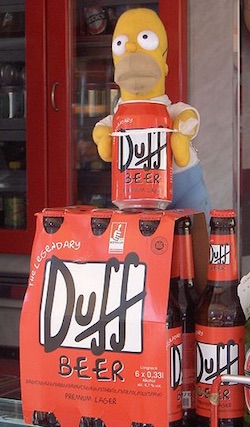By David Flemming
The carbon taxers are billing the Essex Carbon Tax Plan as “revenue neutral. One-hundred percent of the carbon pollution fees will be returned to Vermont electric ratepayers, and the program will be assessed annually by Vermont’s Auditor of Accounts.” This can’t be true because any program carries administrative costs that cannot be returned to the taxpayer. The question here is how much will the bill be?

Homer Simpson holding a can of his favorite beer.
Rhode Island’s 2015 plan for a carbon tax sounds remarkably similar to Vermont’s in that it planned to “return 100 percent of revenue (minus overhead costs) in the form of rebates and programs.” However, rather than the 0 percent of revenues that Essex Carbon Tax insinuates, the proposal predicted 5 percent of revenues would go toward “administrative overhead costs” if it had been passed.
Connecticut’s 2017 carbon tax proposal called for “not more than five per cent shall be used to pay for administrative costs.” Massachusetts does not give a cost estimate, but at least it admits that carbon tax would have administrative costs, while hoping to keep them “presumably low.” British Columbia’s carbon tax was promised to be revenue neutral before its passage in 2008, but it has become “revenue-negative because of administrative costs.”
The Essex plan will supposedly raise $240 million revenue. Assuming the 5 percent administrative costs’ figure that other states have used, Vermonters could end up paying bureaucrats around $12 million.
Additionally, the required annual audit will cost something too. The proposal’s wording is very precise — Vermont ratepayers won’t have to pay for the audit. But somebody will! On April 15, if the ratepayers are spared the bill, Vermont taxpayers will have to pick up the tab. And since ratepayers are generally taxpayers, Vermonters in general will be worse off.
The situation recalls a scheme Homer Simpson in the Simpsons episode “Lard of the Dance.” Here Homer learns that people will pay money for grease. So, Homer decides to cook up all of the bacon in his fridge and sells 4 pounds of bacon grease for $0.63 (he feeds all of the bacon to his dog, which gets sick). Then, Homer’s son Bart decides to question Homer’s actions:
Bart: “Dad, all that bacon cost $27.”
Homer: “Yeah, but your mom paid for that.”
Bart: “Doesn’t she get her money from you?”
Homer: “And I get my money from grease, what’s the problem?”
If proponents of the Essex Plan want to be taken seriously, they should admit that the plan will, at best, cost millions in administrative and auditing costs. As such, the plan is not really revenue neutral. Overall, this latest version of the carbon tax will require Vermonters to spend more in taxes than will be returned in rebates. As Homer would say, “D’oh!”
David Flemming is a policy analyst for the Ethan Allen Institute. Reprinted with permission from the Ethan Allen Institute Blog.



Very funny illustration! Re British Columbia, their carbon tax, highly touted by the Left, actually became revenue negative – a net tax reduction – because they guessed wrong at the inception. Last time I heard the BC government had frozen the carbon tax rate at $30/ton – $10 below the Essex Plan end rate.
If there is truly such a dire need to reduce the burning of fossil fuels and reduce carbon then I fully expect that Vermont will do all in it’s power to discourage tourists from driving to and around Vermont. What sense does it make to raise taxes in an attempt to convince already over taxed residents to reduce their fuel use only to turn around and spend money to convince tourists to do the opposite? Most residents are using their cars to get to and from work………..not to drive to Killington for a day of skiing.
What are these guys, Democrats? Obamacare was going to increase health care, hire tens of thousands of people to administer the program – and reduce the cost. Well, we saw how that worked…
What about all the lost revenues from more people leaving, I suppose these Homers wills say more for those of us who stay!